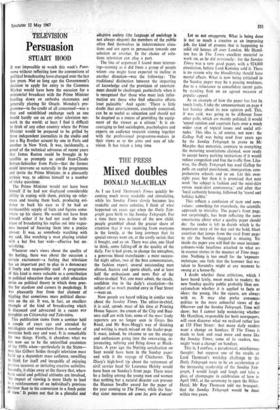Mixed doubles
THE PRESS DONALD McLACHLAN
As I see Lord Thomson's Times quickly be- coming much more readable and stimulating, while his Sunday Times slowly becomes less readable and more sedative, I think of what happened six years ago when the Daily Tele- graph gave birth to the Sunday Telegraph. For a time there was lealousy of the new child; people grumbled about the greater share of attention that it was receiving from everyone in the family, at the long journeys that its special envoys went on, at the costly serials that it bought, and so on. There was also, one liked to think, some falling-off in the quality of the daily. For it had given, to change the metaphor, a generous blood transfusion: a most success- ful night editor, two of the best commentators, the fashion expert, several outstanding men abroad, feature and sports chiefs, and at least half the enthusiasm and news flair of the editor-in-chief. Yet, one must admit, the steady, confident rise in the daily's circulation—the subject of so much puzzled envy in Fleet Street —went on.
Now people are heard talking in similar vein about the Sunday Times. The editor-in-chief, it is said, spends most of his time at Printing House Square; the cream of the City and Busi- ness staff are with him; some of the most lively reporters are no longer seen in Grays Inn Road, and Mr Rees-Mogg's way of thinking and writing is much missed on the leader-page. It must, indeed, be irksome to see the energy and enthusiasm going into the renovating, re- juvenating, relining and firing down at Black- friars. A year ago the Nutting serialisation on Suez would have been in the Sunday paper and with it the voyage of Chichester. The Diary's high-level tip about the retirement of civil service head Sir Laurence Helsby would have been on Sunday's front page. There must be a feeling among the young men and women that nothing but a natural disaster can prevent the Hannen Swaffer award for the paper of the year coming to The Times, while the Sun- day sister murmurs at sont ks prix d'antan? Let us not exaggerate. What is being done is not so much a creative as an improving
job, the kind of process that is happening to solid old houses all over London. Mr Hamil- ton has in The Tunes excellent material to work on, as he did previously: for the Sunday Times was a very good paper, with a 924,000 circulation, before Lord Kemsley sold it. There is no reason why the bloodletting should have mortal effects. What is now being criticised in the Sunday paper may be a passing weakness, due to a reluctance to consolidate recent gains by standing firm on an agreed measure of popular appeal.
As an example of how the paper has lost its touch lately, I take the announcement on page 4
last Sunday about its new opinion poll. This, it was said, was going to be different from other polls, which are mainly political; it would 'sound opinion and ascertain facts over a much wider span of topical issues and social atti- tudes: This idea is, of course, not new: the
Gallup Poll was being used four years ago by the Sunday Telegraph to prove to Mr Marples that motorists, contrary to everything the motoring associations claimed, were ready to accept heavy parking restrictions if it would reduce congestion and free the traffic flow. Like- wise, the Daily Telegraph has used Gallup for polls on capital punishment, immigration, com- prehensive schools and so on. Let this over- sight pass; but then it is promised that next week 'the subject is fashion and the mini-skirt versus maxi-skirt controversy,' and after that 'local authority housing, followed by 'travel and holiday habits.'
This reflects a confusion of taste and news values: something for everybody, the scientific approach to triviality. The paper's front page, not surprisingly, has been reflecting the same uncertainty about what a quality paper should do: the reader is left to decide which is the important story of the day and the bold, black assertion that jumps from the rival front pages to stir the Sunday sluggard is missing. Yet inside the paper you will find the most insistent columns-wide headlines attached to what are in essence stories in the manner of Time maga zine. Nothing is too small for the 'exposure technique; one feels that the hammer that wa' taken to Savundra might at any moment be swung at a house-fly.
I doubt whether these criticisms, which have heard lately, mean much to readers; the new Sunday quality public probably likes sen- sationalism whether it is applied to facts or ideas; the young, like the square, are always with us. It may also prefer consensus politics to the more colourful views of the Observer and the Sunday Telegraph. Time will show; but I cannot help wondering whether Mr Hamilton, responsible for both newspapers, will soon discover what we realised rather late at 135 Fleet Street: that many daily readers want a change on Sundays. If The Times is made to look and read more and more like the Sunday Times, some of its readers, too, might 'want a change' on Sundays.
This is, I confess, a paradoxical, mischievous thought: but suppose one of the results of Lord Thomson's weekday challenge to the Daily Telegraph were to be an acceleration of the increasing readership of the Sunday Tele- graph, I would laugh and laugh and take a glass of champagne in celebration of how in April 1963, at the ceremony to open the Hiltor: Hotel, Mr Roy Thomson told me brusquel■ that the Sunday Telegraph would be dead within two years.






























 Previous page
Previous page